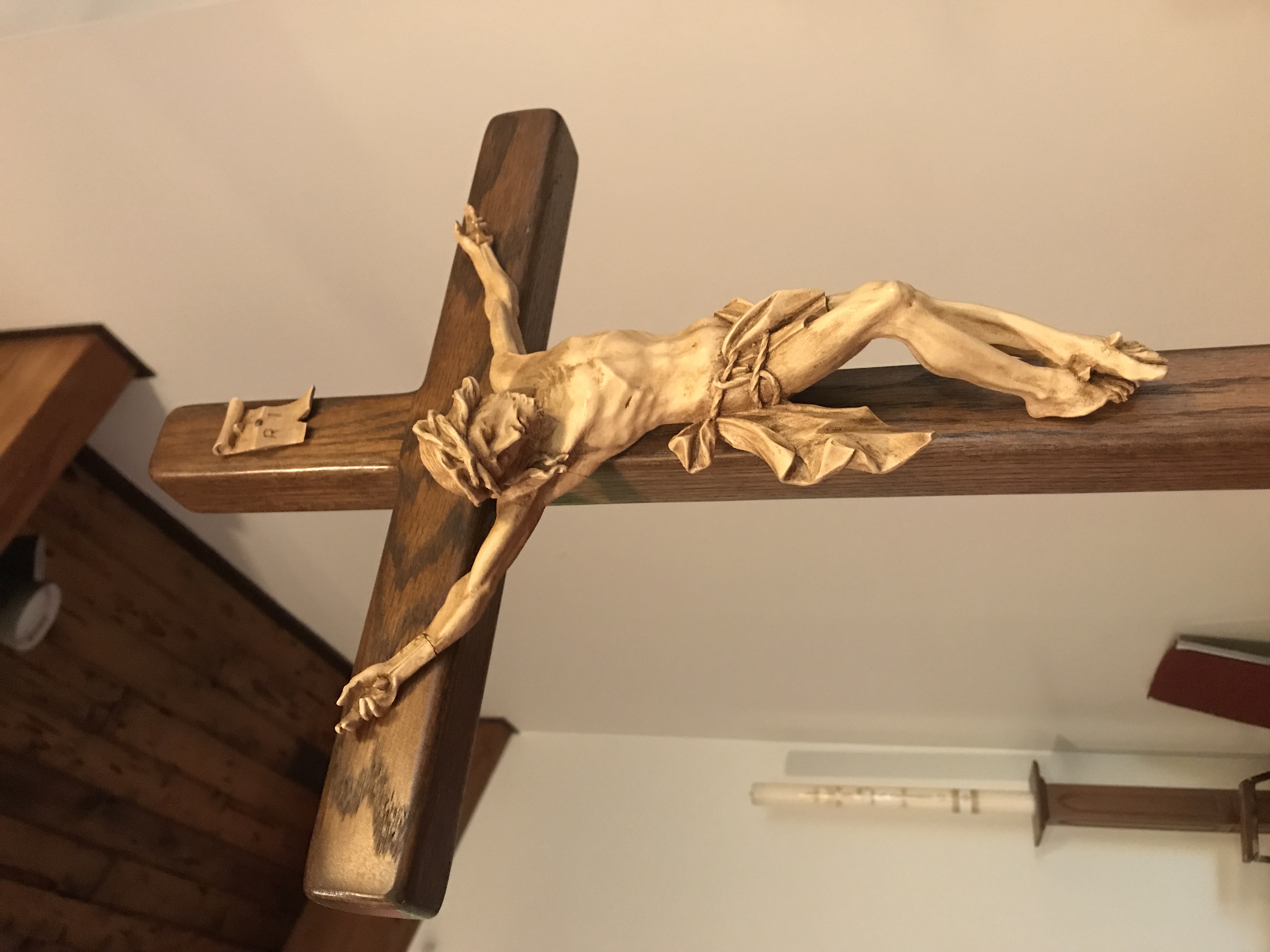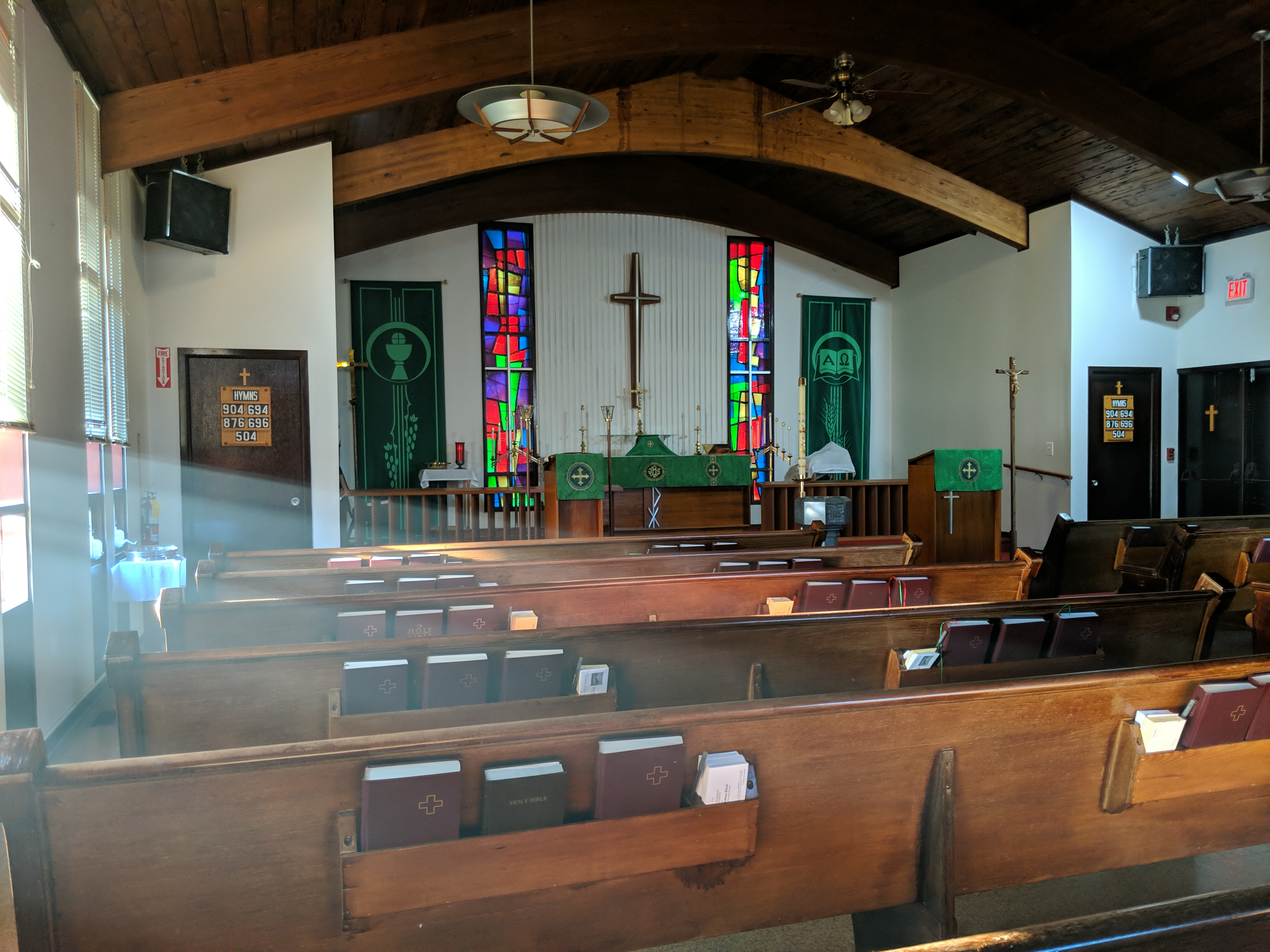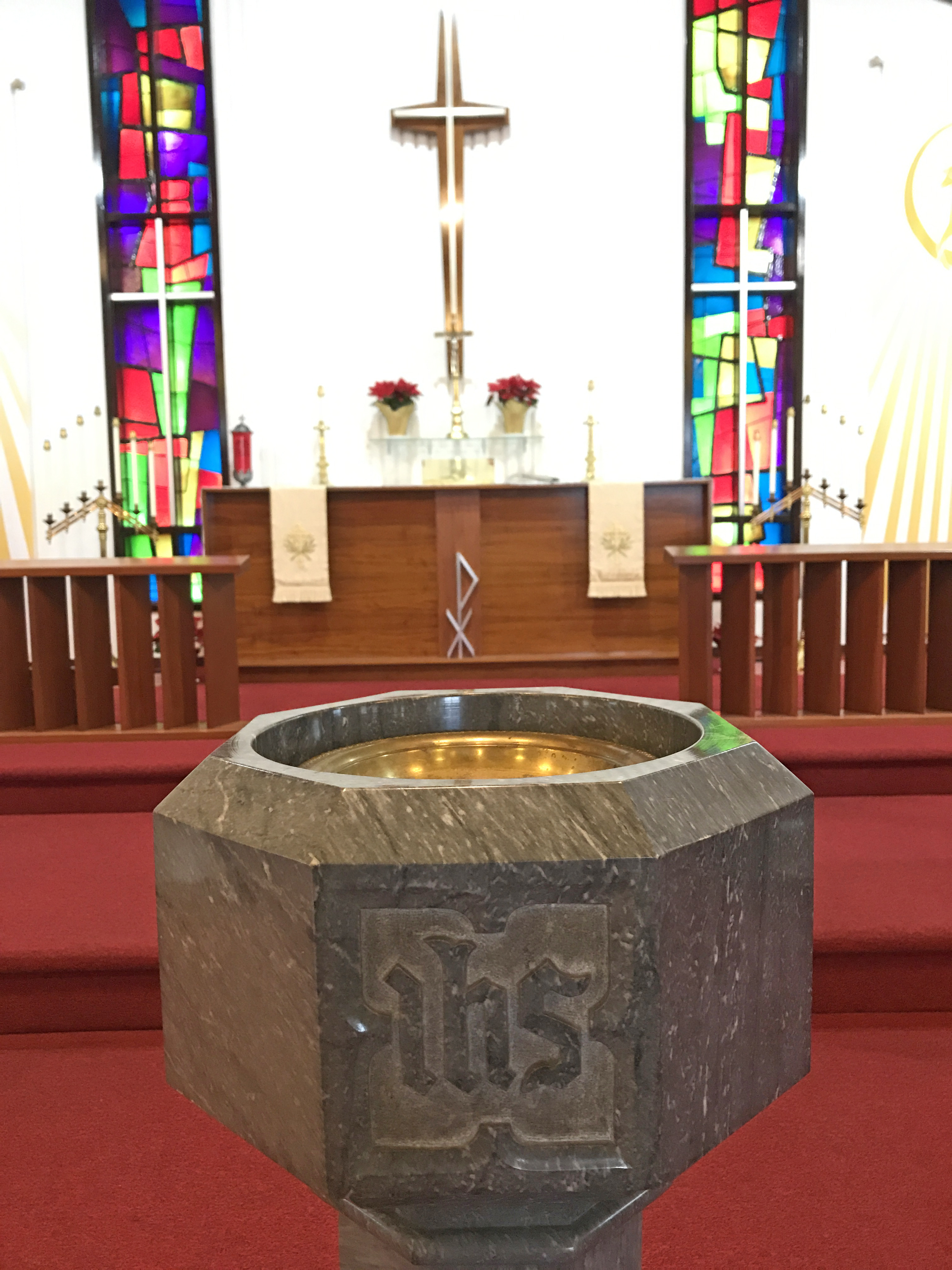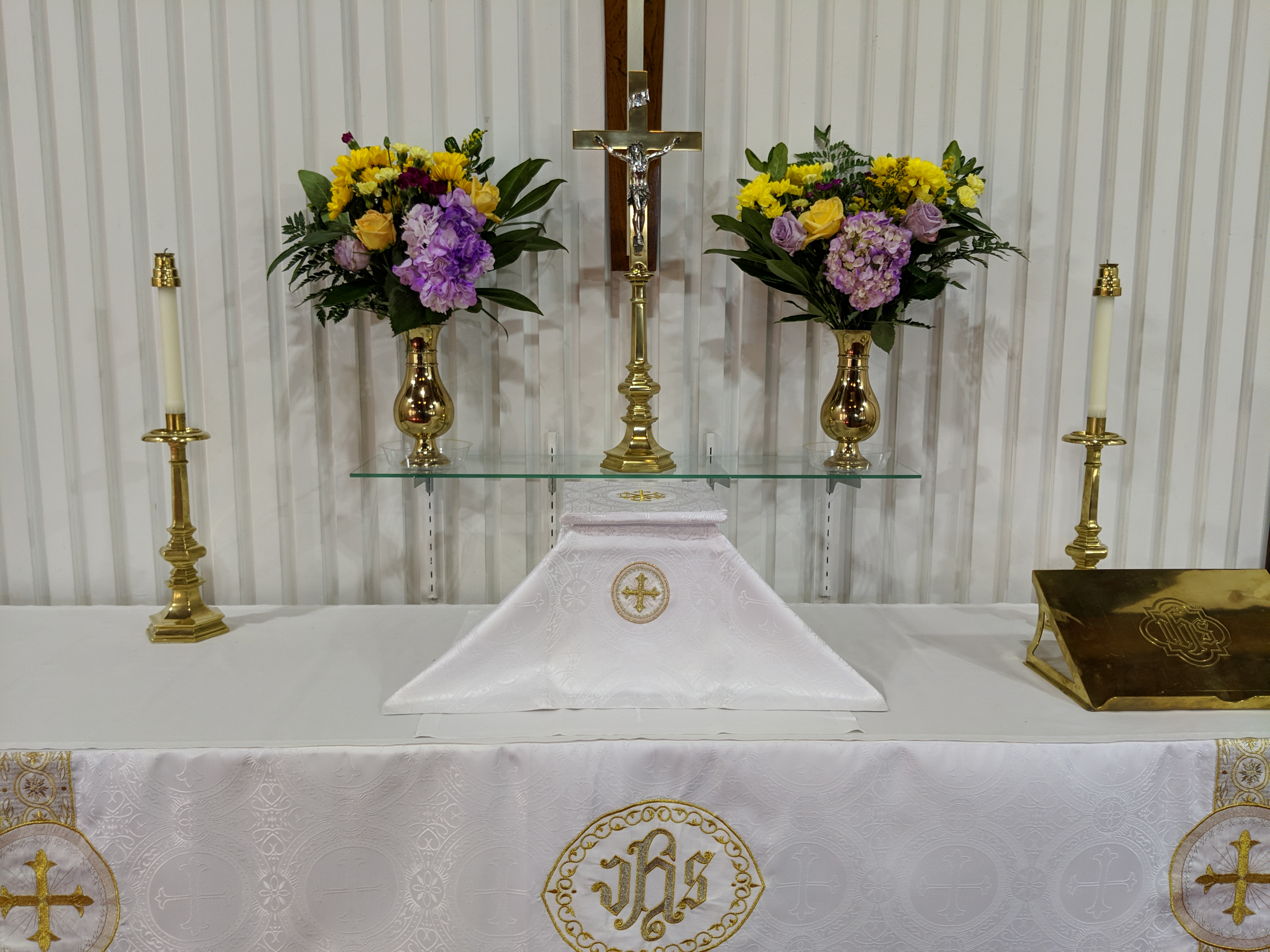The Nativity of Our Lord – Monday 25 December A✠D 2023
✠ Psalmody: Isaiah 9:6;Psalm 98:1-4;118:26a, 27a, 23
✠ Lection: Isaiah 52:6–10;Hebrews 1:1-12;St. John 1:1–14
In the Name of the Father and of the ✠ Son and of the Holy Spirit. Amen.
To what shall we compare this generation? It is like a guest invited to and seated at a great banquet feast and yet proceeds to ignore the Table and eat from the gruel in the dog’s bowl. We shall not completely disparage the gruel, for is it not also provision from the Lord’s hand? Likewise, we shall not disparage the gift of family and presents on Christmas Morning, but we shall rejoice even more here, at His Table, gathered, by God’s will, as an eternal family around the greater Gift Whom He has given.
Here, you feast upon His holy, precious Body and Blood, true food, true drink, true Gift given for you, given to you for the forgiveness of sins. Here, you feast upon His sacred Word faithfully preserved and handed down to you from over countless generations, over countless Christmases, given unto your ear, your mind, your heart for doctrine, for reproof, for correction, for instruction in righteousness, that you may be complete, thoroughly equipped for every good work. The good work that the Lord desires for you in this Christ Mass is that you believe in His Name, in the Name of Jesus; not that you don’t already believe, but that you believe more and more, and that belief comes to do in you what it does: increase your faith, increase your joy, increase your trust in God and therefore increase your hope. Is not this morning all about our hope that extends far beyond the most beautiful of trees and merry brightness?
Our joy is exalted in the Gospel for Christmas Day. There was a man sent from God, whose name was John. This is reference to our great Advent prophet, John the Baptist, who prepared the way of the Lord. But this morning, let’s consider the John who wrote these words, the Apostle, which itself means sent one. From whence was he sent? And does his source, do his beginnings, give us indication as to whether or not his words in this precious Gospel are to be heeded?
What do we know of St. John the Evangelist? Already that he was an evangelist, meaning a writer of Good News, of one of the four Gospel accounts beginning the New Testament. What about before he came to write sacred Scriptures? He was a disciple of the Lord Jesus during His earthly ministry. But before that, what is this man’s pedigree? Like many other of the men that Jesus called to follow Him, John was not much to note. He was a loving brother to James and a helpful son to Zebedee. Together, they were fishermen. Their daily life consisted of tiring, dirty, stinky work that was never guaranteed to yield a catch. From such men, not many seek out knowledge, advice, or teaching. We do not seek out local fish markets or docks in order to sit and talk to such men, but pay high hourly rates to psychologists who sit on comfortable furniture, in inviting offices, really wanting to know about our feelings. Yet, It is from the pen of a fisherman that we have one of the most beloved books among the 66 in the Bible. It is obviously not so beloved because St. John was a highly learned man with an education from under the tutelage of great, renowned thinkers and philosophers of his day. No, his path was not so, so the reason we should listen to him does not originate with man. We need his heavenly words.
The world spins a different tale. Follow the science. Obey every mandate of the government. Listen to the enlightened voices. The Enlightenment has produced much advancement for man while also expecting us to ignore all the setbacks it has brought, especially those setbacks in morality, especially those setbacks in godliness. In that sense, it’s better to consider it the Endarkenment, because by it, we have exalted ourselves, we are now the masters of the universe, and have become puffed up, proud that we have the answers to the creation’s mysteries through theories of evolution and big bangs that inexplicably came from nothing? St. John makes it so clear about the nothing out of which all things were made. He does not employ complex rhetoric or drawn-out arguments. He speaks truth and yet it’s truth so profound, the exalted reason of man could never discover this on his own. This fisherman does what the greatest earthly-minded voice cannot fathom of doing. St. Chrysostom describes what John does for us in this way:
Seest thou then that I said not without cause that this Evangelist speaks to us from heaven? Only see from the very beginning whither he has drawn up the soul, having given it wings, and has carried up with him the mind of his hearers. For having set it higher than all the things of sense, than earth, than sea, than heaven, he leads it by the hand above the very angels, above cherubim and seraphim, above thrones and principalities and powers; in a word, persuades it to journey beyond all created things.
Yes, truth that transcends from heaven is what John gives us this day. We see creation. We see babies being born. We see death. We see deep into space now, yet in none of all that are we able to see into what John makes known to us by the inspiration of the Holy Spirit. By such divine blessing this mere fisherman carries us to The Beginning. The beginning of space. The beginning of time. The beginning of all creation. But though it our beginning, God was before it, because even In the Beginning, before the beginning, was the Word. St. John carries us back to In the beginning, God created the heavens and the earth; there’s the Almighty Father, Maker of heaven and earth. And the Spirit of God was hovering over the face of the waters; there’s the blessed Holy Spirit going about the work He proceeds forth to do. Then God said, there’s the Word, the Eternal Son, “Let there be light”; and there was light. The Holy Trinity was active in creation, but the Good News, the Holy Gospel heralds the truth that is needed in the midst of it, of us being fallen, being in the darkness, being in bondage to our sin and thus even our own will to do something about it. We need this Word to come down. And then, we need to be told that He has.
So, that Word, Who was in the beginning with God the Father, all things were made through Him, and without Him nothing was made that was made. That was the first creation, but we who sat in darkness needed to see a great Light, we needed to be born again, created again, from above, by this same Creator. He came to make us new creations, a miracle which no loftiness of man’s reason can accomplish or even believe, but by the simple, yet eternally profound words of a fisherman do you sit and hear, do you sit and believe on this glorious Christmas morning.
St. John refers to Him as Word, as Light, and as Life. For, we hear of this eternal Word stooping low, so low, down to us, as one of us, to bring true enlightenment to us; enlightenment that comes from the true Light, which gives light to every man, coming into the world. The true enlightening of the mind comes only by the gift of faith. Greater than all the calculations, posits, theories, and gestures of man, is the refreshed, renewed mind that grasps and believes that the Light of the World came into the world to rescue that mind, that soul, that body, that whole person from the eternal darkness in which he sat. That whole person for whom He came is each one of you. The gift of godly reason that follows to Whom faith points is the same reason which comes through God’s gifts of simplicity: water, with His Word; bread, wine, with His Word; the heavenly writings of a fisherman that are His words. It is not by the will of man. Man cannot choose or will himself to get to this point of understanding and believing, but it is by the will of God. O, glorious Christmas comfort!
The Son, the Word, the Light, also came as the Life. He comes full of grace and truth to freely give Light unto our darkened minds and to give the Life which follows it. It is good that you willed yourself to come celebrate this Eternal Son becoming flesh to dwell among us. Here, we behold His glory upon the ear and tongue, glory as the only begotten of the Father. But that desire to be here on Christmas morning didn’t always or even naturally happen within you. The will to come is also the gift of the Coming One, which is both a strike against our pride that may try to masquerade as piety, but also a comforting truth that the new creation that we need to become, the enlightening up out of the darkness that we need to have, the life in place of the death that so greatly clutches us, has all been delivered, not only from outside of us, which makes it far more dependable and steady, but has come from the true source of Light and Life, the eternal Word made flesh. It is Him Whom we praise at His birth, for by that Incarnation and Holy Nativity, proclaimed to us in the simple words of a humble fisherman, we receive the eternal gift of life that reaches beyond every corner of creation, for it is the Eternal God Himself, the Word, the Lord Jesus, Who has come to save us, His people, from the darkness of our sins.
In ✠ Jesus’ Name. Amen.















Comments are closed, but trackbacks and pingbacks are open.